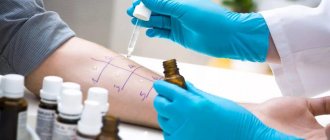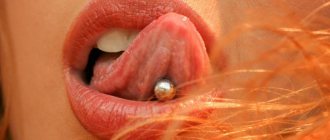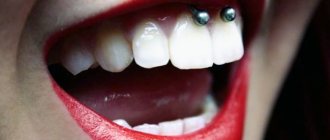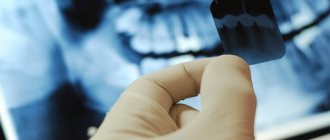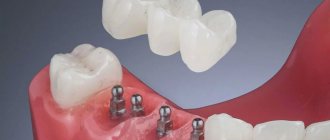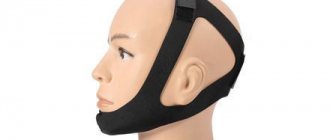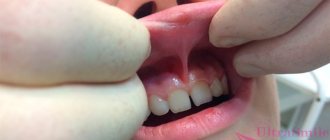Lip piercing or labial piercing is a piercing of the lower or upper part of it for installation in the formed hole of the jewelry. Experts consider this type of puncture to be one of the safest and simplest, since there is a low concentration of nerve nodes and large blood vessels in the lips.
Recently, lip piercing has quickly become popular among youth circles and is considered very fashionable. Both the upper and lower lips, as well as the skin above and below them, are pierced.
Vertical piercing
The most popular type of lip piercing still belongs to vertical lip piercing, as it is a practically safe and almost painless procedure. Traditionally, the lip is pierced exactly in the center (from its lower border to the upper point in the center). If everything is done correctly, this piercing looks great and heals quickly.
For this type of puncture, the best decoration is a labret. Here you need to be extremely careful and scrupulous in choosing decoration. Keep in mind that the length of the bar is determined depending on the thickness of the lips after complete healing of the wound.
This is necessary to avoid mistakes when choosing the size of the jewelry. After all, if the bar turns out to be too short, then this threatens the ball growing into the lip area, and a labret that is too long will constantly hit the teeth, causing irreparable damage to their enamel.
Jewelry in the form of rings is also perfect for this type of piercing. The main task is their correct placement. The piercing must be done so that the jewelry is between the teeth.
Jewelry selection
For a piercing under the upper lip, titanium earrings with a special coating of a non-allergenic composition or jewelry made of medical steel or bioplastic are suitable. These materials do not oxidize over time and do not lose their appearance. They do not emit harmful substances and do not cause harm. Such jewelry is suitable for primary piercing and for daily wear.
According to the shape of the earrings, choose the following:
- horseshoes (it is better to wear such earrings after the wound has completely healed);
- circular;
- segment ring;
- rods;
- rings with a ball or stone;
- clicker rings;
- microbanana.
The ends of the decorations are decorated with cone-shaped or round elements. They should be small so that they do not cause discomfort when worn and do not scratch the enamel of the teeth. Earrings made of precious metals cannot be inserted into the frenulum until the puncture has healed, as the jewelry can oxidize and cause poisoning.
The thickness of the earring should not exceed 1.2 mm, it is better to choose a diameter of 1.6 mm. The bridle is thin, so a small piece of jewelry can break through it.
Carving on the earring
It is better to choose jewelry with internal threads, which are made on the metal itself. Earrings with glued or soldered threads may break. Breakage may result in injury to the oral cavity and loss of jewelry. There is a high probability of swallowing broken elements of the earring, which will lead to damage to the esophagus.
The internal thread does not injure the bridle when threading the jewelry through the puncture. If the product is sanded, there are no protrusions on it that can catch on the skin and scratch it. These earrings are easier to remove when replacing jewelry.
Polishing
The better polished the earring, the faster the piercing will heal. It is better to give preference to products from the expensive segment. They are polished by hand, and the quality of each piece of jewelry is checked.
Earrings produced on an industrial scale are polished with grain. Microdefects remain on the surface of the jewelry. Microbes accumulate in the depressions, and dried blood, lymph and saliva stick to the protrusions. The accumulation of pathogenic flora on the earring leads to infection of the frenulum and the development of complications.
Integrity of decoration
It is preferable to choose titanium earrings, since their production uses the technology of tuck- ing a solid base from a blank without welding the decoration elements. This method of turning eliminates the possibility of harmful impurities, which are contained in the solder used for soldering jewelry elements, getting into the metal alloy. Foreign inclusions can provoke the development of allergies and rejection of the material. A dart from a solid base also helps to achieve maximum smoothness on the surface of the earring.
Earrings made of silver and gold are always made from several elements that are soldered together with solder. If you choose jewelry made from precious metals, you should give preference to products from well-known brands that value their reputation and do not use harmful impurities in the manufacture of jewelry.
Horizontal piercing
Horizontal labial piercing is not very popular among beginners; as a rule, it is done by real piercing connoisseurs. Horizontal piercing initially involves a deep puncture, which is performed parallel to the lip. It is usually done on the lower lip from left to right. A labret with 2 balls, one of which is removable, is suitable as a decoration.
Also, not only the labial parts of the face are pierced, but also the skin above or below them. There are several varieties of such piercings: Dahlia, Snakebite, Monroe, Madonna, and Medusa.
Symptoms
Identifying the problem in both cases is usually not difficult.
Signs of lipoma:
- mobile and painless, sizes can range from a few millimeters to 10-15 cm;
- to the touch - doughy or dense;
- not fused to the skin - the skin easily moves over the formation;
- never becomes inflamed – i.e. There is no redness or swelling of the skin above the lipoma.
Most often, lipomas are located on the limbs, head and torso; they are almost never on the face.
Piercing above and below the lip
Madonna and Monroe are very popular types of piercings above the upper lip, when the decoration in the form of a pebble or ball resembles the “spot” (mole) of the famous actress Marilyn Monroe. The only difference is that Madonna is always pierced on the right, and Monroe is only pierced on the left above the upper lip.
This piercing is done in one minute and is almost painless. This is all because the tissue at the puncture site is very thin.
Two punctures made on both sides like flies (moles) above the upper lip are called Dahlia.
But similar double punctures made under the lower lip are called a little mysteriously and at the same time frighteningly - Snake Bite.
Jellyfish is a so-called groove piercing that simulates a tear in the mouth.
Before getting a lip piercing, seriously weigh all the pros and cons of this event.
You should know that lip piercing can be accompanied by very unpleasant consequences:
- Exacerbation of chronic diseases, one way or another related to teeth.
- The occurrence of cracks in tooth enamel.
- Redness, inflammation and bleeding of the gums.
- The front teeth begin to crumble and break.
Such troubles most often occur in people under twenty-five years of age.
How to pierce a septum
If you look into the past and see what they use to pierce the earlobe, we have a very large selection, it was a joke, of course. We will need a pharmacy because that is where we can buy:
- Piercing needle
- Intravenous catheter
There is a standard for diameters, but manufacturers write differently, some write the outer diameter, some write the inner diameter, so you can only navigate by trial and error.
Basically, a 14g needle is used for facial piercing; the jewelry should be the same size, no smaller and no larger; if the jewelry is of a smaller diameter, the blood will flow non-stop.
Needles are also sold on Aliexpress, I can advise you to buy them with a reserve and wish you good luck.
Who should not get a puncture?
Unfortunately, there is also a certain circle of people for whom lip piercing is generally contraindicated.
1. Firstly, these are teenagers under the age of eighteen. 2. Also, people who have poor blood clotting are diabetics.
However, a temporary obstacle to piercing can be a period of exacerbation of any chronic disease and even a banal acute respiratory infection, as well as elevated temperature.
If you are still determined to pierce your lip, contact a specialist in a tattoo parlor. Everything will happen there quickly, efficiently and in sterile conditions. It is advisable to perform this procedure when piercing the navel - it is safer.
But if you decide to do the piercing yourself, go to the pharmacy and buy: cotton wool, sterile gloves, alcohol, meramistin solution, an IV system, antibiotic ointment.
Treatment
Now that we have figured out the difference between a lipoma and an atheroma, let’s move on to the next question: is it necessary to remove the lipoma or remove the atheroma? Let's start with the fact that conservative treatment of lipoma, as well as treatment of atheroma, is absolutely futile. Moreover, aggressive influence on these formations using various “folk” remedies can cause suppuration of atheroma, as well as malignancy (malignancy) of lipoma.
Tactical approaches to the treatment of lipoma are as follows: if the lipoma is small (2-3 cm), does not grow and does not cause any inconvenience (does not rub against clothes, is not a cosmetic defect, etc.), then it does not need to be removed. In case of growth (especially rapid growth), it is better to go for surgery. If the lipoma grows, then sooner or later you will still have to remove it, but it is better to do this while it is small in order to avoid large incisions and traumatic intervention. Any removed lipoma should be sent for histological (under a microscope) examination.
As for atheroma, it is recommended to remove it in any case, because practice shows that sooner or later they fester, and during surgery against the background of inflammation it is not always possible to completely remove the atheroma capsule, which is fraught with relapse (reappearance of the formation). In addition, when suppuration occurs, the wound is almost never sutured; it heals by secondary intention, which often leads to the formation of a rough scar. If, after removing the atheroma, it turns out that the formation does not have a capsule and does not contain atheromatous masses, it should be sent for histological examination to exclude dermatosarcoma, which is sometimes similar in appearance to atheroma.
How to pierce your lip quickly and without pain? Procedure
Disinfect the earring or labret. First, soak the decoration in alcohol for twenty minutes, then boil it in a small bowl of water.
Before the piercing, do not forget to eat well, because after the piercing you should not eat for the next four hours.
Then rinse your mouth with a saline solution (one level teaspoon of salt per glass of warm water). Wash your hands with antibacterial soap and generously moisten cotton wool with alcohol and wipe the outside of the lip area intended for piercing. Let it dry. Then use a marker to mark the puncture points.
All necessary tools should be located near the mirror within easy reach. Hands must be sterile.
Before a puncture, you need to calm down so that your hands don’t tremble. Then, slightly retracting the lip, with a confident movement we push the sterile needle from the dropper through the point marked with a marker, and, inserting the decoration into the hollow catheter, place it in the formed hole. The entire procedure lasts no more than 2 minutes.
Please note that the lip is pierced from the inside. In order for the piercing to be in the planned place, the piercing angle should be maintained (90 degrees). After the decoration is secured, the outside of the wound must be treated with a miramestin solution.
To speed up the healing of the piercing site, rinse your mouth two to three times a day for six weeks and after each meal with a saline solution or a soft pink solution of potassium permanganate.
The piercing causes the lip to swell and the swelling will persist for about three days.
Read: ear piercing or how to pierce an ear at home.
Prevention
It is impossible to predict the behavior of a scar after an injury , but you can reduce the risk of keloid scars. Silicone gels and patches can help with this; they help prevent the growth of scar tissue. These methods are effective provided that the scar is fresh (no more than six months). Silicone products help maintain the correct water balance in scarred skin and create additional pressure, due to which the blood vessels in the scar are reduced.
It is recommended to start preventing scar formation after 3-4 weeks, when the crusts have completely come off from the wound. The healing area must be kept clean, washed with soap and under no circumstances remove the stratum corneum from the wound - this will cause infection, and this is a sure way to the formation of a keloid scar!

